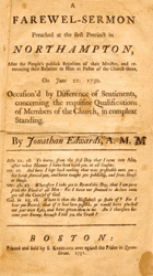JE SUX!
Why JE SUX
by Mark B. Ryan: Dean, 1976-1996
The following talk was given at the Jonathan Edwards Birthday Feast in October, 1996, as the speaker neared the end of his two decades as Dean of J.E.

On this solemn occasion, we celebrate both the College and the man whose name it bears, and I hope that you will allow me a few words about the heart and soul of each. Regarding the College, the most profound question we could ask— the query of queries —is of course, this: “Why does J.E. suck?” There is both an historical and an ontological answer to that question. Allow me to address them both.
For those among you who might not be aware of it, I should explain that the cry of “J.E. Sux”— spelled s-u-x —despite its seeming self-deprecation is, in fact, a rallying cry of pride, the clarion that this past year trumpeted the College to its first intramural athletic championship since 1959. I have a special vantage point on this query of queries, since J.E. began to suck precisely on November 1, 1975, only a few months before I became Dean. The time in which J.E. has sucked, therefore, corresponds almost exactly to the period of my deanship. Not that I bear any responsibility for it, mind you, since on that fateful day in 1975 I was serving safely as Acting Dean of Calhoun College. But I do consider it my grave moral obligation to address this question, specially as historian, since that is my profession and since after my departure, I don’t know that there will be anyone around to tell the story.
In Mexico in 1975, that particular weekend meant the Day of the Dead; elsewhere in America, it meant All Hallow’s Eve; but at Yale it meant… BLADDERBALL! Bladderball was the annual ritual unique to this campus, timed generally for the Saturday morning of Dartmouth Weekend, just after midterm, when spirits were most in need of venting. Each of the colleges and major extracurricular organizations formed teams, or better said, mobs; they gathered on the Old Campus, squawked at, rushed at, and insulted one another— until without warning an inflated canvas ball six feet in diameter rolled from Phelps Gate into the crowd. Whichever team could get this monstrous sphere out of the Old Campus, normally over the High Street fence, was declared the winner; the ball was then borne up Hillhouse Avenue and ceremoniously turned over to the President at his house.
To understand the dynamics of that memorable November 1, you have to appreciate the pitch of excitement that rose to a crescendo in anticipation of the day. As a broadside in the Yale Daily News put it two days earlier, “In the future, wars will not exist— but there will be…Bladderball!” Teams issued threats and insults in the News, which organized the event. That year, for example, Davenport declared, “You wanna die? Meet us at 10 and bring an ID so we can notify your next-of-kin.” The News itself countered— with uncharacteristic accuracy —that the Oldest College Daily “leads the nation in total offensiveness.” Everyone claimed an unbroken string of victories in the past, and WYBC, the University radio station, thanked the “participants who year after year willingly cast their bodies beneath our heels, squirming and kicking like spiders on a hot stove.”
That tasteless denigration of spiders, our College mascot, could not have gone down well in J.E; and here a small group of seniors hatched an ingenious plot. A few of them would hide out in an uppe r floor room of McClellan Hall with a rope attached to a grappling hook. When the ball was released, some of their co-conspirators on the field would maneuver it into position and attach the hook; it would then be whisked up above the crowd and tossed to other, waiting members of the team, who would spirit it over the fence.
r floor room of McClellan Hall with a rope attached to a grappling hook. When the ball was released, some of their co-conspirators on the field would maneuver it into position and attach the hook; it would then be whisked up above the crowd and tossed to other, waiting members of the team, who would spirit it over the fence.
Initially, the plan worked gorgeously: the J.E. team on the field got the ball into position just moments after it hit the Old Campus. But alas, the hook punctured the ball; it quickly deflated just after it had rolled through Phelps Gate; and Bladderball ’75 came to an abrupt, ignominious, and anti-climactic end. Other teams got a sense of who was responsible, and though the conspirators managed to escape with their lives, cries of “J.E. sucks” broke out on the Old Campus.
The Daily News later recorded the aftermath, which was well worthy of the Day of the Dead. I quote:
“After the Bladderball’s untimely demise, mourners carried its limp remains to CCL, around the circulation desk, and tried to put it on closed reserve. The grief-crazed Ballbearers then dragged it up Hillhouse and presented it to the President. Brewster led a death chant (“give me a ‘B,’ etc.) and threw the crowd a volleyball in return.”
Later at the Yale Bowl, during the Dartmouth Game, in the midst of an uninspiring cheer that was falling flat, a lone voice warbled “J.E. sucks.” That solitary cry, however, was the voice of fate, for it tapped the disappointment of the crowd. Soon the entire Yale student section— or eleven-twelfths of it —was erupting with the chant, “J.E. sucks!”
The words stuck, even if their bitter edge began to soften. They were taken up regularly at subsequent football games; and in the spring, when it was announced in Calhoun College that their Acting Dean would become Dean of J.E., I was met with good-natured cries in the dining hall and courtyard of “J.E. sucks.” And I wondered, my God, what had I taken on.
Men and women of the College, I bring you to the nadir of J.E.’s reputation. It is, however, testimony to the indomitable spirit of this College that before long the taunt became a rallying cry, the term of opprobrium a badge of honor. Credit for that belongs especially to one group— the magnificent J.E. hockey team of the 1976-77 year, which began to call itself the “Sux,” spelled s-u-x. At a time when the College stood near the bottom of intramural Tyng Cup rankings, it was hard to argue with the performance of the J.E. Sux. They rolled over Davenport, bashed Timothy Dwight, crushed Calhoun; and the College rallied behind them, turning out in crowds for late-night games at Ingalls Rink, chanting with exuberance and renewed pride, “J.E. Sux!”
Inspired by that chant, the team rolled on undefeated— not only that year, but for the next three years to come. They broke the record for the longest undefeated streak in the history of Yale intramural sports and then kept on winning, forging a new record of 55 games that still gloriously stands. They had cheerleaders; they had a student begin games by singing the national anthem; and the Yale hockey coach was heard to remark that he wished his team could bring out crowds like that. They won four straight championships— and it was all to the chant of “J.E. Sux!” The inevitable tee-shirts appeared in the College, saying “Sux et Veritas.” The moniker “Sux” spread to other J.E. teams and then became a rallying cry for the College as a whole, as it has been right up until now, in days of even greater glory, when we could do the unthinkable and capture the Tyng Cup— to the resounding chant of “J.E. Sux!”
Such, my friends, is the historical answer to this query of queries. Let’s turn now to the ontological issue— which will require a change of tone. To address it, I invite you to take a much longer leap back into history, to a particular moment in the life of Jonathan Edwards, the man. It is a moment to which, at this passage in my own life, I find myself irresistibly drawn. Apparently through some inescapable karma, Ginger and I are about to follow what Ross Perot has called that “great sucking sound” coming from south of the border. We are moving to Mexico, and I shall leave this Deanship that I have occupied since 1976.
On July 1, 1750, Jonathan Edwards stood before his congregation at the church in Northampton, Massachusetts, for the last time. He had served as their minister for over twenty years. Now well into midlife, he must have felt as if he were going off to a distant land to work in a foreign culture, because his next calling, though not so far away by our standards, was on the frontier, at the outpost of Stockbridge, where he was to minister to the Housatonic tribe. I am pleased to say that much of his best work was still ahead of him; but at this moment, he was looking back over his years with his congregation.
Let me simply read to you a few passages from his “ Farewell Sermon,” delivered on that day. Even from this distant perspective, his words are still charged with his powerful feelings of the moment: “How often,” he said, “have we met together in [this] house…, in this relation? How often have I spoken to you, instructed, counselled, warned, directed and fed you, and administered ordinances among you, as the people which were committed to my care, and whose precious souls I had the charge of? But in all probability, this will never be again…. [N]othing remains, but that I bid you all farewell…. I desire that I may never forget these people, who have been so long my special charge, and that I may never cease fervently to pray for your prosperity.” At this moment of departure, Edwards chose to direct himself explicitly to the young people of his congregation. “Since I have been settled in the work of the ministry, in this place,” he said, “I have ever had a peculiar concern for the souls of the young people…; and have especially exerted myself in order to it; because I knew the special opportunity they had beyond others…. I have sought the good and not the hurt of our young people. I have desired their truest honor and happiness1….” Well, don’t let me run too far with this painfully self-indulgent analogy. There are of course many differences between the departing minister of two-and-a-half centuries ago and the departing Dean of today— besides the obvious one of the immeasurably greater stature of the former. For one, Edwards puritanically warns against the “levity” and “frivolity”— I might say the “spirit” —to which youth is prone, the very spirit that surely infuses “J.E. Sux.” But his “Farewell Sermon” concludes, nevertheless, with some advice that just as surely bears on my theme.
Farewell Sermon,” delivered on that day. Even from this distant perspective, his words are still charged with his powerful feelings of the moment: “How often,” he said, “have we met together in [this] house…, in this relation? How often have I spoken to you, instructed, counselled, warned, directed and fed you, and administered ordinances among you, as the people which were committed to my care, and whose precious souls I had the charge of? But in all probability, this will never be again…. [N]othing remains, but that I bid you all farewell…. I desire that I may never forget these people, who have been so long my special charge, and that I may never cease fervently to pray for your prosperity.” At this moment of departure, Edwards chose to direct himself explicitly to the young people of his congregation. “Since I have been settled in the work of the ministry, in this place,” he said, “I have ever had a peculiar concern for the souls of the young people…; and have especially exerted myself in order to it; because I knew the special opportunity they had beyond others…. I have sought the good and not the hurt of our young people. I have desired their truest honor and happiness1….” Well, don’t let me run too far with this painfully self-indulgent analogy. There are of course many differences between the departing minister of two-and-a-half centuries ago and the departing Dean of today— besides the obvious one of the immeasurably greater stature of the former. For one, Edwards puritanically warns against the “levity” and “frivolity”— I might say the “spirit” —to which youth is prone, the very spirit that surely infuses “J.E. Sux.” But his “Farewell Sermon” concludes, nevertheless, with some advice that just as surely bears on my theme.
In leaving his congregation, Edwards chose to emphasize the “vast importance,” the centrality, of their community life. He expressed that advice negatively, admonishing them to avoid “contention.” “A contentious people,” he said, “will be a miserable people.” But his message, essentially, was that the welfare of the congregation depended on its internal closeness and harmony, and on its members’ support of one another. That welfare, in short, depended on the congregation’s value as a place of nurture.
And that, believe it or not, brings me to the ontological meaning of “J. E. Sux.” It is curious that sucking has acquired a bad name, that it is now our preferred term of opprobrium. The images that might underlie that connotation, I ask you not even to contemplate. Search the roots of the word more deeply, I would argue, and you will find a very different meaning and a far different connotation. Despite the College’s adopting the term in mock combat, that deeper meaning, in fact, is the very opposite of contention.
The psychiatrist Carl Hammerschlag points out in a recent essay that sucking is the ultimate image of nurture: we enter the world by sucking air, nurtured by our environment; we are sustained in it by sucking milk, nurtured by our connection with humanity. The etymology may be different, but I think of the word’s homonymous relation to succor, to provide aid and support, to give assistance, especially in time of need.
It used to be that to suck was a transitive and not an intransitive verb: one sucked something. “The task in our lives,” writes Dr. Hammerschlag, “is to find good things to suck from. Something that…fulfills us, sustains us.” And those things, he suggests, are found in community, in our connections with one another— such as the connections that, year after year, are formed in this College. “This is how we thrive…,” he concludes, “building community, weaving relationships— getting connected. That,” he writes, is “what sucking is about. Fill your spirits with it2.”
I hope you forgive me if, inspired by the man whose birthday we celebrate, I have turned to sermonizing— and worse, have stretched a metaphor beyond what any of us think it should be allowed to bear. But when I look back on my twenty plus years in this congregation, it is its sucking in Dr. Hammerschlag’s sense— the connectedness, the relationships, the mutual support —that looms largest in my mind. Throughout that time, J.E. has had a reputation among Yale Colleges for a particular intimacy, a particularly strong sense, I like to think, of community. That, I believe, has been its distinctive character. In that time, we may not always have been free of contention, but I have had many an occasion to admire the J.E. students’ mutual connection and support as they have rallied around one another in crises; as the musicians among them, for example, have turned out time and again to applaud one another; or when I hear, as I did last month, of the wedding plans of two of them five years after their graduation.
Personally, I have benefited greatly from that support from other administrators, from Master Berny and Norma Lytton and their predecessors; and it has been the high privilege of my professional life to have had the opportunity, in some small way, to offer it— to “minister,” if I might use that word, to the approximately 2,500 students who have been through the College in my tenure, facing crises, making discoveries, getting educated, dealing with one another, bringing “levity” and “frivolity” to this hall, and moving more deeply into their lives.
Most of those 2,500 students are gone from here now, following out their destinies in what appear to be rich and productive lives. Some have attained a measure of fame, and a few of them, alas, have died. But the College community lives on. This is “how it thrives— building community, weaving relationships —getting connected. That’s what sucking is about. Fill your spirits with it.” As long as the College lives on, thrives, fills its spirits in that way, then no matter what distant lands I travel to or what foreign cultures I labor in, I shall delight in my remembered associations with it. And I shall be proud to stand up and say before all the world, “J.E. Sux!”
Notes:
Jonathan Edwards, “Farewell Sermon,” in Clarence H. Faust and Thomas H. Johnson, eds., Jonathan Edwards: Representative Selections, with Introduction, Bibliography, and Notes (New York: Hill and Wang, 1962), 186-202.
Carl A. Hammerschlag, M.D., The Theft of the Spirit (New York: Simon and Schuster, 1993), 119 ff.

